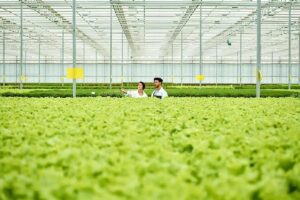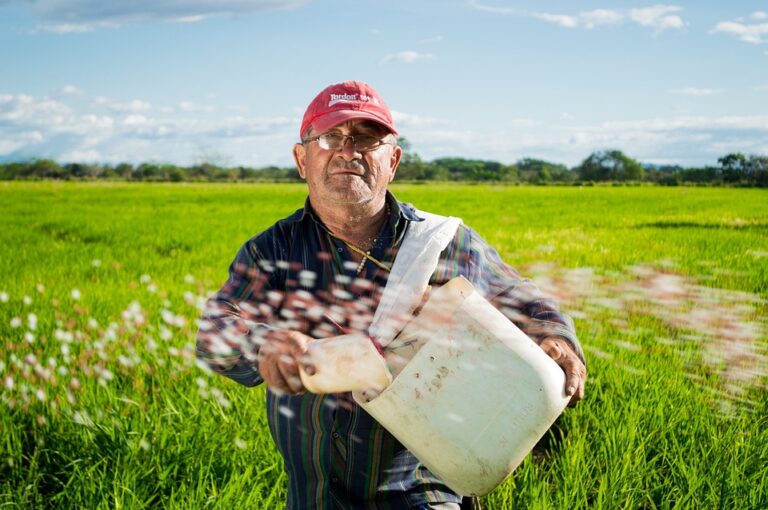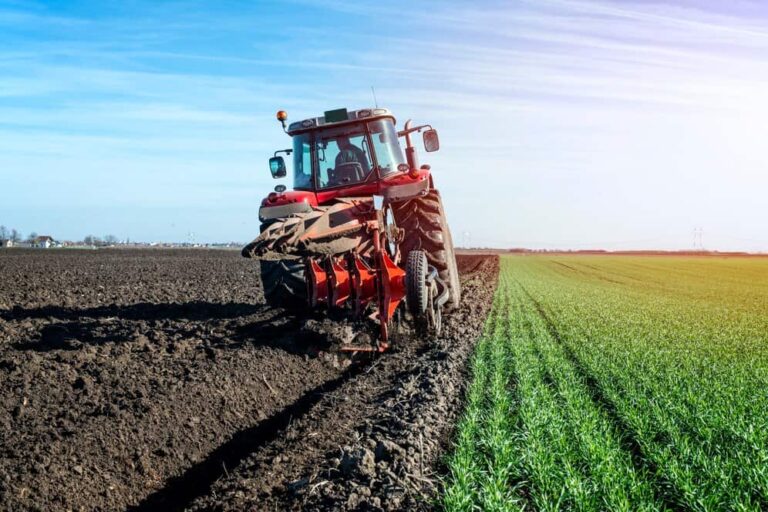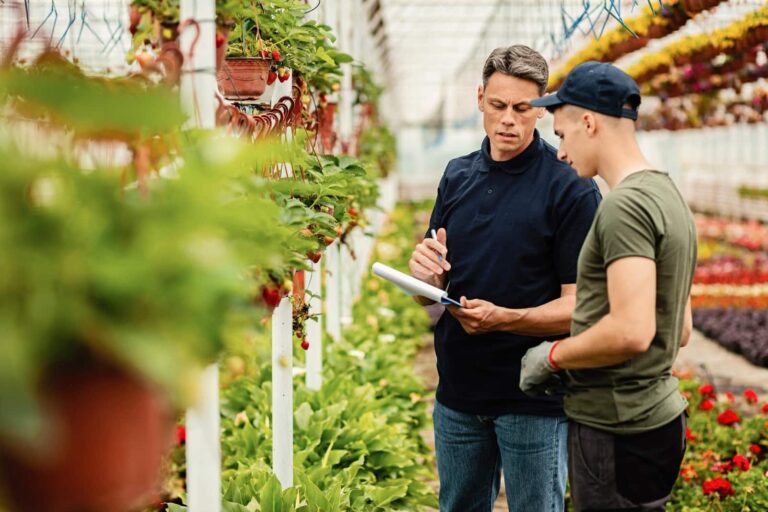Agriculture, an enduring cornerstone of human civilization, encompasses the cultivation of plants and the rearing of livestock, forming the bedrock of our sustenance and survival. It not only fuels our bodies but also our economies, societies, and the planet itself. Historically, the shift from nomadic lifestyles to farming enabled communities to settle, thrive, and evolve, illustrating agriculture’s transformative power. Today, it remains a dynamic field, adapting to and mitigating challenges such as climate change, population growth, and resource depletion, thereby continuing its legacy as a vital lifeline for humanity.
Economic Growth and Agriculture
Agriculture’s influence on the global economy is profound and far-reaching. It serves as the primary income source for rural communities, offering a pathway out of poverty by generating jobs and stimulating local markets. In many developing countries, agriculture accounts for a significant portion of GDP and exports, underscoring its role in trade and international relations.
Furthermore, agricultural advancements drive innovation and technology transfer, enhancing productivity and efficiency. Thus, a thriving agricultural sector is not merely a sign of economic health but a catalyst for comprehensive national development.
Ensuring Food Security
The fundamental mission of agriculture is to provide a reliable supply of food, a mission growing ever more critical in the face of escalating global demand. Through diverse practices such as crop cultivation, livestock breeding, aquaculture, and horticulture, agriculture ensures a balanced and nutritious diet for the world’s population. Innovations in agricultural techniques have improved food accessibility and affordability, yet challenges like malnutrition and food distribution disparities persist.
Addressing these issues is essential for achieving global food security and represents a significant focus of agricultural policy and research.
Agriculture and Environmental Sustainability
Agriculture’s relationship with the environment is intricate, holding the dual role of custodian and beneficiary. Sustainable practices, such as organic farming, conservation tillage, and integrated pest management, minimize impacts on natural ecosystems while enhancing resilience to environmental stressors.
Agriculture’s potential to combat climate change, through carbon sequestration and renewable energy production, is increasingly recognized. Balancing agricultural productivity with environmental conservation is critical for sustaining the planet’s health and ensuring long-term food security.
The Role of Agriculture in Social Cohesion
Beyond its economic and nutritional roles, agriculture fosters community and unity. In rural areas, farming activities often form the heart of social life, strengthening bonds and fostering a collective identity. Agriculture supports traditions, customs, and knowledge transfer across generations, contributing to cultural heritage and social stability. Moreover, the shared challenges and triumphs of agricultural work promote solidarity and cooperation, reinforcing the fabric of communities and society at large.
Employment Generation through Agriculture
Agriculture is a significant employment engine, offering a spectrum of opportunities from traditional farming to roles in agritech, research, and sustainable resource management. This sector is particularly crucial in rural areas, where it can be the primary source of livelihood, reducing rural-to-urban migration.
By investing in agricultural education and innovation, nations can unlock economic prosperity, enhance food production, and uplift communities, demonstrating agriculture’s pivotal role in shaping a sustainable future.
Agriculture’s Contribution to a Greener Environment
The verdant fields and rich biodiversity associated with agriculture contribute significantly to the planet’s health. Practices like agroforestry and cover cropping enhance soil fertility, water retention, and biodiversity, offering a counterbalance to urbanization’s grey expanses. Moreover, agriculture plays a key role in landscaping and urban green spaces, improving air quality, and offering aesthetic and recreational benefits. Embracing agriculture’s capacity for environmental enhancement is essential in our pursuit of a more sustainable and visually pleasing world.
The Significance of Sustainable Agriculture
Sustainable agriculture is not a luxury, but a necessity in our quest to balance human needs with ecological preservation. It embodies practices designed to increase productivity and food security while minimizing environmental degradation and resource depletion. Sustainable agriculture fosters resilience against climate variability, enhances soil health, conserves water, and supports biodiversity. Its adoption is crucial for ensuring that we can feed today’s global population while safeguarding resources for future generations.
Agriculture’s Impact on Civilization Development
The genesis of agriculture marked a pivotal turn in human history, facilitating the transition from nomadic tribes to settled societies and igniting the spark of civilization. This transition enabled humans to cultivate surplus food, which led to the development of trade, the accumulation of wealth, and the emergence of cities, laws, and governments. Agriculture’s influence extended beyond the field; it shaped social structures, economies, and cultures, laying the groundwork for advancements in art, science, and technology.
The ability to sustain larger populations due to agricultural productivity propelled humanity towards innovation and complexity in social organization, illustrating agriculture’s indelible mark on the course of human evolution.
The Importance of Genetic Engineering in Agriculture
Genetic engineering in agriculture heralds a new era of food production, characterized by increased efficiency and sustainability. By introducing traits such as drought tolerance, pest resistance, and enhanced nutritional content, genetically modified crops offer a solution to some of the most pressing challenges facing modern agriculture, including climate change, soil degradation, and the need to feed a growing global population.
This technology holds the promise of higher yields, reduced dependency on chemical pesticides and fertilizers, and the potential for farming in previously inhospitable regions, making it a cornerstone of future agricultural strategies.
Key Highlights: The Essentials of Agriculture
- Food Security: Ensures the availability of food for global populations;
- Economic Stability: Acts as a backbone for economies, especially in developing countries;
- Social Cohesion: Fosters community ties and cultural heritage;
- Environmental Stewardship: Plays a critical role in conserving natural resources and biodiversity;
- Innovation and Employment: Drives technological advancement and offers myriad employment opportunities.
Comparative Analysis: Traditional vs. Sustainable Agriculture
| Feature | Traditional Agriculture | Sustainable Agriculture |
|---|---|---|
| Objective | Maximizing yield and efficiency | Balancing productivity with environmental health |
| Methods | High chemical input, monoculture farming | Organic farming, crop rotation, reduced chemical use |
| Impact on Environment | Often leads to soil degradation, water pollution, and loss of biodiversity | Aims to enhance soil health, conserve water, and support biodiversity |
| Economic Efficiency | Short-term gains in productivity and profitability | Long-term sustainability, potentially higher costs in the short term but more sustainable profits |
| Social Impact | Can lead to rural depopulation and loss of traditional knowledge | Supports rural communities and preserves cultural practices |
| Sustainability | Less sustainable due to reliance on non-renewable resources | More sustainable, aims to use resources responsibly and maintain ecological balance |
Conclusion
As we stand at the crossroads of history, facing unprecedented global challenges such as climate change, population growth, and resource depletion, the role of agriculture in our society has never been more critical. The path forward requires a thoughtful reassessment of how we cultivate our lands and nurture our planet. Sustainable agriculture emerges not just as an alternative, but as an imperative—a means to heal our world and ensure that future generations inherit a planet that is bountiful and resilient.
The transformation of agriculture from traditional to sustainable practices is more than an agricultural revolution; it is a societal commitment to stewardship of the earth, social equity, and economic viability. By integrating the lessons of the past with innovative technologies and sustainable practices, we can forge a new agricultural paradigm that respects the limits of our planet while fulfilling the needs of its inhabitants.











